Top 10 Signs of Premature Aging and How to Prevent Them
Our bodies are wonderful machines. They do almost everything we ask of them every day and rarely ask for anything other than food, sleep, and water.
Still, we should realize that even the best machines may fail from time to time. The same is with our bodies, they are prone to diseases, different dysfunctions, and other failures. So when your body does fail to do a certain task, this may provoke a response which can be from small inability to perform some job to serious life-threatening illnesses.
This is a basic law of nature: If your body does something wrong, it can lower your chances to survive in nature.
The reason is that the natural law does not allow for a person who is not healthy to be part of the system, because their inabilities may affect future generations and put whole human race survival in danger.
Warning Signs
However, one of the body’s best abilities is to warn us that something is wrong before it gets too serious. One warning sign everyone knows is a pain. When something hurts, it’s because something is wrong.
No human can ignore pain, so this lets us know we should fix some problems in our bodies. Pain can never be a problem on its own, this is only a symptom of underlying health problems.
However, do you know the top 10 signs of premature aging? These are signs your body is giving you which warn that if you don’t make some changes, you will be visiting the mortuary sooner rather than later.
Top Signs of Premature Aging
Your body may be aging faster than you might realize. Discover if you have any of the top 10 signs of premature aging and learn how to prevent them!
- Dull or Thin Hair
Sometimes, thinning hair is due to hormonal imbalances or certain medications, but if you notice that you are losing far more hair than is normal, or if your hair is coming out in patches, is dull, dry, and brittle, then you might want to check with your doctor. Thin dull hair can sometimes be a sign of lupus, anemia, or thyroid cancer.
If you have thin dull hair, you may want to see your doctor as soon as possible, especially if you do not have a history of thinning hair in your family. - Droopy Breasts
While this happens to many women after breastfeeding, years of going bra-less, or losing weight, it also happens to many women after menopause. Sagging anything is a sure sign of age, so you might want to double-check that you are wearing bras that fit properly and find out how to uplift the sagging breast.
Many women consider breast lifting surgery to improve the shape of their breasts, but only 1 percent of women are actually able to find a solution: breast lift without breast augmentation surgery. - Age Spots
Isn’t this why they are called age-spots? These slightly darker spots on your skin, usually on the back of the hands and on the cheeks, are a dead giveaway that you are no longer a spring chicken unless you are still in your 20s or 30s! Use lightening creams or see a dermatologist.
If you have dark spots, you may need to be treated with medication to suppress these symptoms. Other possible treatments are steroids and surgery, but they can cause unpleasant side effects like allergic reactions, swelling and bleeding. - Skimpy Lashes or Eyebrows
This is another telltale sign of aging. Hormonal changes in midlife leave lashes less than full and brows thin, especially on the outer edges. Use makeup to help fill them in or use Latisse, which stimulates the growth of new eyelashes.
These are a couple of the more popular ways to fill in your lashes. However, if you choose to use a product for eyelash growth, you may have to be aware of possible side effects. - Yellowing Teeth
Like an old horse, yellow teeth are a sure sign that you have spent too many years sipping coffee and sodas. Use whitening gel kits or see your dentist.
But the best way is to prevent changes in teeth colors by choosing diets free of artificial sweeteners, and reducing intake of coffee and tea. - Dry, Flaking, Leathery Skin
Dehydrated or sun wasted skin looks and feels flaky, itchy, and not at all attractive. Hormonal changes can also lead to dry skin, which makes you look far older than you actually are. Use sunscreens and super moisturizing lotions and creams.
You should also make sure your diet includes plenty of antioxidants, nutrients, vitamins and minerals required for a healthy skin. If you still have problems, see your doctor or dermatologist. - Difficulty with Memory
Ok, it’s normal to forget where the car keys are every now and then, however, it’s not normal to find them in the refrigerator, especially if you are under 50! If you think you might be having memory issues, see your doctor and consider taking omega-3 fish oil or krill oil supplements.
You may also want to try nootropic supplements that include a bunch of ingredients that might help improve memory, focus and concentration. They are also useful if you’re looking for a natural way to get rid of the cognitive issues that can be experienced by certain individuals (particularly those suffering from Alzheimer’s disease). - Hairless Feet/Toes
While most women think that this is a great thing, it might actually be a sign of high cholesterol and blocked arteries. When cholesterol builds up in the body, it can clog up arteries, which feed blood to our skin and hair follicles. This causes hair to fall out.
If you are under 50 and find that the hair that used to be on your toes or feet is suddenly missing, check with your doctor. - Spots on the Chest
An uneven color or dark spots, even moles, are generally a sign of a woman who has been out in the sun too long. If you are under 40 and your décolletage is showing these signs of age, use sunscreen and talk to your dermatologist.
However, even if you’re over 40 and your décolletage is showing these signs, don’t just ignore them. Take a look at these spots carefully and have a consultation with a healthcare expert. - Bruises That Stick Around
Bruises happen, but if yours tend to stick around forever, this is a sure sign that something isn’t right. See your doctor right away!
Reference




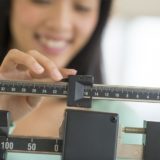


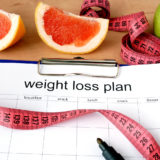
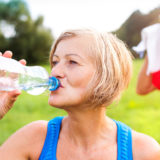
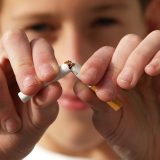

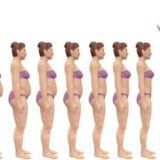

Great article about top 10 signs of premature aging!